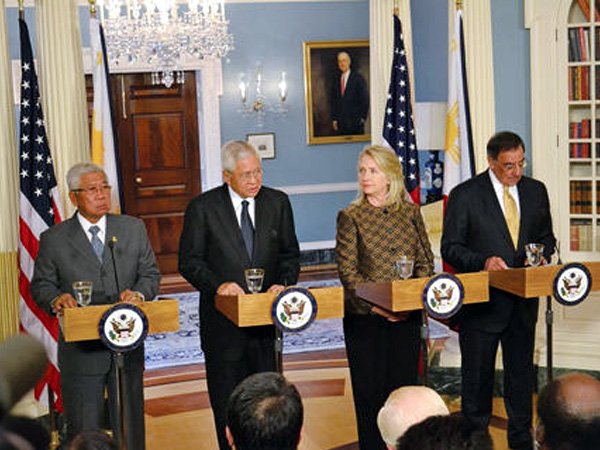PH can’t depend on US in conflict vs China despite the Mutual Defense Treaty
First of a two-part series
Over the weekend, the Department of Foreign Affairs (DFA) announced that the United States will triple its military funding for the Philippines this year. The Southeast Asian country stands to get $30 million from Washington this 2012, up from $11.9 million it received last year.
The news came days after DFA Secretary Albert del Rosario and defense chief Voltaire Gazmin went to the American capital for a “2 plus 2” meeting with their respective counterparts, Hillary Clinton and Leon Panetta. The high-level discussion centered on the four-week standoff between China and the Philippines at the Scarborough Shoal (or Panatag Shoal for Filipinos). “We oppose the threat or use of force by any party to advance its claim,” Clinton said.

It is inevitable for the US to be involved in the raging maritime dispute between the two Asian countries. America has a 60-year-old mutual defense treaty (MDT) with the Philippines. Signed in August 1951, the eight-article treaty states that America will come to the aid of its former colony and vice versa whenever the latter’s territorial integrity, political independence, or security is threatened by an “external armed attack in the Pacific area” (Article III).
Both parties recognize that an attack on either of the parties “would be dangerous to its own peace and safety” (Article IV). Such “armed attack” includes any of the following: a) an armed attack on the metropolitan territory of either of the Parties, or b) on the island territories under its jurisdiction in the Pacific Ocean, its armed forces, public vessels, or aircraft in the Pacific (Article V). The MDT therefore is like an insurance of sorts for the Philippines as it confronts a fast-rising China, but is it really the case?
It must be recalled that together with the infamous parity rights (where Americans were given the same rights as Filipinos to exploit the natural resources of the Philippines), MDT came into being shortly after World War II. Teodoro Agoncillo, the preeminent 20th century Filipino historian, in 1960 described the “highly touted” identical interests of the Philippines and the United States as “more rhetorical and sentimental than real and substantial.” He added: “No two independent nations ever had or could have identical national interests owing to geographic, economic, and ideological factors[1].”

Still embroiled in a decade-long war in Afghanistan, the US is certainly not in a position to engage in another military conflict, especially with a fellow superpower. First, their economy is still in a recession. And after the debacle in Iraq committed by the Bush administration, it will be very hard for US leaders to justify to the American public why they need to meddle in another foreign war.
Texas Rep. Ron Paul, a Republican presidential candidate, argues that America should not be acting like the policeman of the world anymore because of its limited resources. “It’s time we quit this! It’s trillions of dollars we’re spending on these wars!” Paul once declared in a debate. His presidential run may not be successful, but his platform of non-interventionism has gained many adherents across America.

Advocates of a more aggressive US foreign policy include Arizona Sen. John McCain and Connecticut Sen. Joseph Lieberman. McCain was the Republican presidential nominee in 2008 while Lieberman was the running mate of Democrat Al Gore in the 2000 presidential elections. Both visited the country January of this year. Their hawkish views has been sidelined in this election cycle, a year when even the Republican Party, which used to campaign on an anti-terrorism platform, has focused more on the economy than foreign policy.
[1] Agoncillo, Teodoro and O. M. Alfonso. A Short History of the Filipino People. University of the Philippines Press. Manila, 1960. p. 570
Read: Philippines Role May Expand as U.S. Adjusts Asia Strategy (from New York Times)







Do you think the Philippines should fear China? Is the threat real?
I think the dispute will not escalate to a shooting war, but China is really determined to show its might.
your extremely right with your opinion…100% i agree, its time US mind thier own business, and stop acting like a knight in shining though in fact they have their own interest… i thank US for what they did in PH before,,,but i don’t really agree with them right now,,,their just making things worst..if i now they even convince Noynoy to go over war, yet in the end… they just drop us like a hot potato..BWISIT!
Kaya alam mo, we really can’t be very assured na US will be on ur side no matter what.
LESH, bring you bolo and faced the missile of china…now we need u.s.a + eu to strengthen our military…until we can stand alone.. phillippines still the most corrupt country…kaya malayo pa ang lalakbayin ng pilipinas…
sabah island nga na talagang atin,,,walang magawa ang govt.
Hi. Thanks for reading. Sabi ng ilang FB contacts ko, US abandoned us daw during the 1960s – when we were really pressing our claims over Sabah. As you know, Malaysia now owns Sabah. It is a former colony of Great Britain na siya namang mother country ng US.